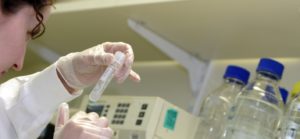T-cell lymphoma medicine now accessible for all Australians
Wednesday, 28 March 2018
The Leukaemia Foundation welcomes the Federal Government’s announcement that the cancer medicine pralatrexate, sold under the name Folotyn, will be added to Pharmaceutical Benefits Scheme (PBS) from 1 April 2018.
Folotyn is used to treat patients aged 18 years or older with peripheral T-cell lymphoma (PTCL) after previous treatments have not worked or have stopped working.
PTCL is a rare type of non-Hodgkin lymphoma a cancer of the lymphatic system. It develops from mature T-cells, a type of white blood cell that play a central role in the immune response of the body. PTCL may be found in the lymph nodes, skin, bone marrow, liver, or spleen.
The Leukaemia Foundation says the announcement is an important step to ensure all Australians living with PTCL have access to the treatment they need.
“This listing will make a substantial difference. It means that Australians with PTCL who have run out of treatment options can access this treatment which is showing remarkable results. We are another step closer to a time when no one will die from this disease,” a spokesperson said.
PTCL accounts for approximately 7% of all non-Hodgkin lymphoma cases, equating to about 440 Australians diagnosed each year. It commonly affects people aged over 60 years, however diagnosis can occur anytime in adulthood. It is slightly more common in men than it is in women.
The Leukaemia Foundation is the only national charity dedicated to helping those with leukaemia, lymphoma, myeloma and related blood disorders survive and then live a better quality of life.
The Leukaemia Foundation invests in blood cancer research leading to clinical breakthroughs through a variety of mechanisms, including a new partnership with Cancer Australia’s Priority driven-Collaborative Cancer Research Scheme.
Read more about peripheral T-cell lymphoma here.
Last updated on July 15th, 2022
Developed by the Leukaemia Foundation in consultation with people living with a blood cancer, Leukaemia Foundation support staff, haematology nursing staff and/or Australian clinical haematologists. This content is provided for information purposes only and we urge you to always seek advice from a registered health care professional for diagnosis, treatment and answers to your medical questions, including the suitability of a particular therapy, service, product or treatment in your circumstances. The Leukaemia Foundation shall not bear any liability for any person relying on the materials contained on this website.